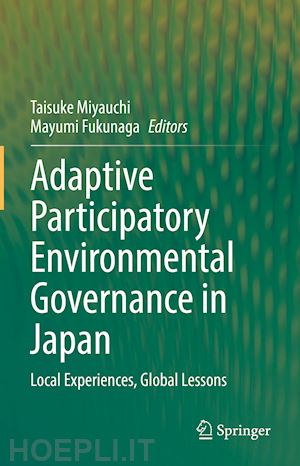
Questo prodotto usufruisce delle SPEDIZIONI GRATIS
selezionando l'opzione Corriere Veloce in fase di ordine.
Pagabile anche con Carta della cultura giovani e del merito, 18App Bonus Cultura e Carta del Docente
This book contributes to the theoretical and practitioner literature in environmental governance and sustainability of natural resources by linking case studies of the roles of narratives to the three key practices in local environmental governance: socio-political legitimacy in participation; collaboratively creating stakeholder-ness, and cultivating social and ecological capabilities. It provides numerous theoretical insights on legitimacy, adaptability, narratives, process-oriented collaborative planning, and among others, using in-depth case studies from historical and contemporary environmental issues including conservation, wildlife management, nuclear and tsunami disasters, and thus community risk, recovery, and resiliency. The authors are all practitioner-oriented scientists and scholars who are involved as local stakeholders in these practices. The chapters highlight their action and participatory-action research that adds deeper insights and analyses to successes, failures, and struggles in how narratives contribute to these three dimensions of effective environmental governance. It also shows how stakeholders’ kinds of expertise, in a historical context, help to bridge expert and citizen legitimacy, as well as spatial and jurisdictional governance structures across scales of socio-political governance
Of particular interest, both within Japan and beyond, the book shares with readers how to design and manage practical governance methods with narratives. The detailed design methods include co-imagination of historical and current SESs, designing processes for collaborative productions of knowledge and perceptions, legitimacy and stakeholder-ness, contextualization of contested experiences among actors, and the creation of evaluation standards of what is effective and effective local environmental governance.
The case studies and their findings reflect particular local contexts in Japan, but our experiences of multiple natural disasters, high economic growth and development, pollutions, the nuclear power plant accident, and rapidly aging society provide shared contexts of realities and provisional insights to other societies, especially to Asian societies.
Taisuke Miyauchi is a Professor of the Faculty of Humanities and Human Sciences at Hokkaido University in Sapporo, Japan. As an environmental sociologist, he has researched the social-ecological systems of several areas in the Solomon Islands and Japan. He specializes in natural resources management, community development, and environmental governance. He has led some research projects on environmental governance, including the MEXT KAKENHI (Grants-in-Aid for Scientific Research Program)project titled "Sociological study on adaptive governance in uncertainty and plurality.” His authorship includes Kaihatsu to seikatsu senryaku no minzokushi (An ethnography of development and livelihood strategies) and Hitobito no shizensaisei (Nature regeneration and local people). He is also interested in the social history of the fishing industry, and coauthored Katsuobushi to Nihonjin (Dried bonito and Japanese people). Miyauchi has edited and published several books as well, including Hansaibai no kankyo shakaigaku (Environmental sociology of semi-nature), Naze kankyo hozen wa umaku ikanai noka? (Why does environmental conservation fail?), and Dosureba kankyo hozen wa umaku iku noka? (How can environmental conservation work?). Additionally, having been focused on the reconstruction and recovery following the Great East Japan Earthquake, he edited and published Saigai to chiiki saisei (Disaster and community regeneration).
Mayumi Fukunaga is an Associate Professor of Environmental Sociology and Ethics at the Department of Socio-Cultural Environmental Studies, Graduate School of Frontier Sciences, the University of Tokyo, Japan. Her works center on interdisciplinary issues at the interface of ethics, environmental governance, and ontological histories of non-human species, particularly in connection with aquaculture politics in the aftermath of natural and anthropogenic disasters, environmental justice in co-designing social-ecological systems, and foodscapes and foodways in the Anthropocene. Her most recent book is Sake wo tsukuru hitobito: Suisanzoshoku to shigensaisei (Futuring Salmon: Dreams of Marine Ranching in Ruins), and she is the coeditor of Mirai no kankyo rinrigaku (Environmental Ethics for Futures). Her recent non-humans of focus are seaweeds including seaweeds as communicator species of social-ecological systems’ resilience and rainbow trout as a cosmopolitan and tech-adaptable species.











Il sito utilizza cookie ed altri strumenti di tracciamento che raccolgono informazioni dal dispositivo dell’utente. Oltre ai cookie tecnici ed analitici aggregati, strettamente necessari per il funzionamento di questo sito web, previo consenso dell’utente possono essere installati cookie di profilazione e marketing e cookie dei social media. Cliccando su “Accetto tutti i cookie” saranno attivate tutte le categorie di cookie. Per accettare solo deterninate categorie di cookie, cliccare invece su “Impostazioni cookie”. Chiudendo il banner o continuando a navigare saranno installati solo cookie tecnici. Per maggiori dettagli, consultare la Cookie Policy.